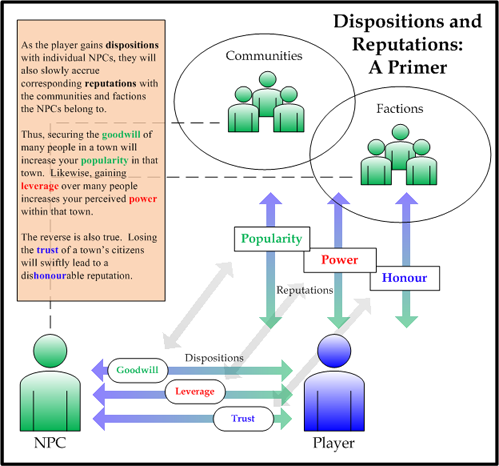Be honest. When you play an MMORPG, how often do you actually read the quest text? If you’re an insipid little fanfic-writing manchild like myself, that would be “fairly often”. But let’s pretend for a moment that you’re an average person with a life to lead and limited time for repetitive virtual-life activities. You don’t really care why you have to go slaughter 10 imaginary people with no relevance to you or your character. You just want the cash and experience points. Hurry up and click that “accept” button. There’s killing to do!
So what of the quest-giver? The person who stands there in the same place every day, enticing adventurers to engage in possibly questionable acts with the promise of money and a fleeting sense of accomplishment, presumably for no better reason than that they’re too lazy to do it themselves. What’s their deal? Do these NPCs seem to have believable motivations for doing so?
Amazingly, in some cases, they do. And that can make for a great quest. Sometimes there’s a story there that is actually interesting enough for players to give a hoot about the NPC and what they hope to accomplish. But what if on top of that, the player could get involved with that NPC’s life, influence them, befriend them, recruit them as an employee, even betray and ruin them?
This is the heart of the idea behind Citadel’s social system. It’s about involvement. It’s about the NPCs that give quests, repair your gear and buy your junk being a part of your character’s story - A part of your adventuring life.
Anyone who’s a fan of computer RPGs in general is familiar with the concept of factions and reputation. Do quests to aid the town guard and they’ll like you more, give you commendations, sell you cheap supplies, grant you ranks and faction-specific gear. It’s satisfying and gives you a sense of place and context within the game world.
Some games take this further with the concept of disposition. Doing quests for a particular person makes them like you more, trust you more. They may even do you favours and open the door to talking to more important people.
Our system takes this yet another step further. In Citadel, as you develop a working relationship with an NPC, you actually gain three forms of disposition with them. These are Goodwill, Leverage and Trust. Do them a favour and you will increase your Goodwill. Show them that you are not to be trifled with, make them owe you money or favours and you will increase your Leverage over them. Conduct yourself with honour and integrity and you will earn Trust.
These are the basic units of social currency in the world of Citadel. You can use these to persuade your NPC contacts to grant you favours, lend you money, put in a good word for you and provide you with information. More importantly, they can introduce you to further contacts - an element essential to Citadel’s social gameplay: It’s about forging a network of contacts which enables you to not only interact with the game world, but subvert it to your own ends.

Now, all this may sound a bit pie in the sky. That’s understandable. The key here is that such a system needs solid underlying mechanics and well-defined boundaries. This has been our challenge with designing this social system. We want it to do a lot, and as we continue to develop it, we fully expect it to be as complex and content-intensive as our combat system.
I should mention here that if politics and skullduggery aren’t your cup of tea, have no fear. The intricacies of the social system aren’t for everyone, and if you want to just get in there and bash monster skulls, that’s not only fine, but encouraged. The system is designed so you can choose your own level of involvement with NPCs and contacts.
In future blog posts, I’d like to elaborate on the hows and whys of Citadel’s social system. I’ll explain how your disposition with your contacts affects your overall reputation in factions and communities, as well as how that all ties in with Citadel’s political “endgame”. I will describe how town centers have evolved from merely being somewhere to repair, trade, rest and get new quests… The taverns and backrooms of Citadel are social battlegrounds where invisible wars are fought with negotiation, intrigue and lies.
Next week, we’ll get back to the violent stuff - combat, weapon skills, armour and stances. For now though, I’ll leave you to have a great week!
